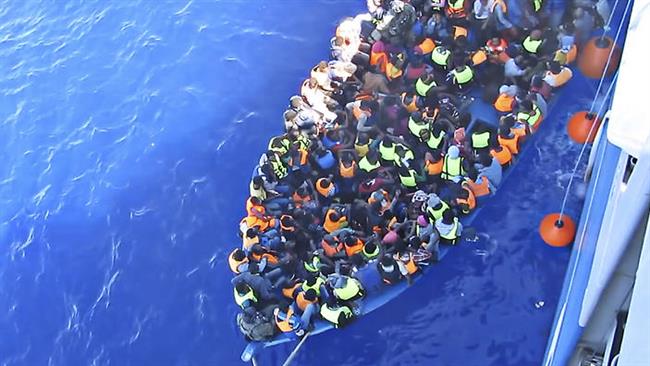UN: Refugees traded in Libya ‘slave markets’
The United Nations has raised alarm over a climbing number of refugees passing through Libya who are being traded in so-called slave markets before being held for ransom and subjected to malnutrition and sexual abuse.
Migrants are typically traded for as little as $200 to $500, and are held for an average of two to three months, said the head of the UN migration agency’s Libya mission, Othman Belbeisi, in a Geneva press briefing on Tuesday.
He emphasized that “migrants are being sold in the market as a commodity,” cautioning that “selling human beings is becoming a trend among smugglers as the smuggling networks in Libya are becoming stronger and stronger.”
Many of the asylum seekers are used as day laborers in construction and agriculture, Belbeisi further stated, noting that although some are paid, others are forced to work without pay before being sold again to new buyers.
He also pointed to the extremely tragic fates that female refugees often encounter, saying, “About women, we heard a lot about bad treatment, rape and being forced into prostitution.”
According to a report released Tuesday by the agency, officially called the International Organization for Migration (IOM), its representatives have spoken to African refugees who recounted their experiences of being bought and sold in garages and parking lots in the southern Libyan city of Sabha, one of the nation’s main refugee smuggling hubs.
In the report, the IOM recounted the story of a Senegalese refugee – referred to as ‘SC’ to protect his identity -- who spoke of being ‘bought’ and taken to his first ‘prison’ – a private home where more than 100 asylum seekers were beaten and held as hostages.

SC, the report added, was asked to pay 300,000 Central African Francs ($480) for his release, which he could not pay. He was then sold to another Libyan, who set his release price at 600,000 CFA ($970).
The Senegalese refugee further spoke of awful sanitary conditions and meals offered only once per day, adding that he was eventually able to get money from his family and work as an interpreter to avoid future beatings.
However, the IOM report added, others are not so lucky. Those who cannot pay are often killed or left to starve to death. They are buried without being identified.
“What we know is that migrants who fall into the hands of smugglers face systematic malnutrition, sexual abuse and even murder,” said IOM’s director of operations and emergencies, Mohammed Abdiker. “We are hearing about mass graves in the desert.”
The development came as Libya remains a major gateway for asylum seekers hoping to reach Europe via the Mediterranean Sea, with more than 450,000 people making the crossing over the past three years.
So far this year, of an estimated 26,886 refugees who have crossed into Italy, more than 600 are known to have drowned at sea while an unknown number perish during their journey north through the desert, according to press reports.
Canada’s Yukon town council at standstill over refusing oath to King Charles
Yemen's Houthi calls for jihad to protect Palestine against Israel
VIDEO | Internal rifts within Israel
Russia launches 'ICBM' for first time against Ukraine: Kiev
Scores killed as Takfiri terrorists target Shia Muslims in Pakistan
Pezeshkian to US, Europeans: You are killing women, children
VIDEO | COP29: another climate failure?
ICC issues arrest warrants for Netanyahu, Gallant for war crimes













 This makes it easy to access the Press TV website
This makes it easy to access the Press TV website